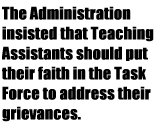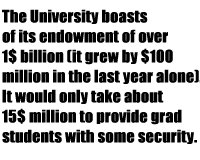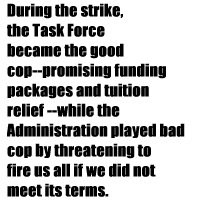
David Goutor
2. It was as close to an admission that serious problems existed as could be hoped for from senior University executives. But as the months -- and our negotiations -- dragged on, the Task Force idea was going nowhere. The nomination process for Task Force members had not even begun.
3. Suddenly, with little more than a week before our original strike deadline of December 22, the Task Force was hastily assembled. The timing spoke for itself. Nevertheless, Adel Sedra, the Vice President and Provost in Charge of Academic Affairs and the Budget, insisted that Teaching Assistants should put their faith in the Task Force to address their grievances. During the strike, the Task Force became the proverbial good cop--promising to consider guaranteed multi-year funding packages and tuition relief for senior doctoral students--while the Administration played bad cop by threatening to fire us all if we did not meet its terms.
4. In the final settlement, the Union won a delegate to the Task Force--one of four students on a committee of about twenty. From the first meeting I attended as the union rep, I was struck by how the prevailing sentiment of most of the Administrators (and many but not all of the professors) on the committee was typical of company officials after a messy confrontation. It can be summed up as follows: "We've done absolutely nothing wrong in the past -- but now we have to do something dramatically different."
5. Also prevailing in the committee seemed to be the notion that the University is managing the best it can with limited resources. The University of Toronto's annual operating expenses are almost $1 billion and it ran a surpus last year of between 7$ and 15$ million. The University boasts of its endowment of over 1$ billion (it grew by $100 million in the last year alone) and it is one of the largest property holders in the 5th largest metropolitan area in North America.
6. When it was determined that it would only take about 15$ million to provide grad students with some security, suggestions were made in the Task Force (usually by the students members) that the university did have the resources to provide grad students with this security now. These suggestions were dismissed. Instead, the vast majority of the Task Force's attention has been focussed on improving financing in the future.
7. And that future does look bright -- for students entering their programs in about 2005. It seems likely that the Task Force will recommend minimum funding packages for four years. The level currently under consideration is the cost of tuition, plus $12,000 for living expenses (in its own literature, the U of T identifies living costs in this city at a minimum of $14,000 annually for a single student with no dependents). But the final report will probably fix a five-year period for implementing the new guaranteed funding levels and packages.
8. Moreover, realization of the new funding system will be contingent on the University raising new monies for them.
9. For those of us at the U of T now, the picture is less rosy. It is unlikely that any of us will see much benefit from this vaunted new focus on graduate funding. But it's not a total loss. The principal issue in our strike was tuition relief. The University has not been able to ignore that entirely. In the planned scheme, student funding will rise as tuition rises. More importantly for what committee members like to call the "current cohort" of students, the only new funding for the next academic year will be a tuition "bursary" guaranteed for all students in 5th, 6th and 7th years (the “post-4” years). They will receive a $2,500 rebate on their expected $5,400 in fees.
9. The immediate creation of this so-called "post-4" fee scheme will be perhaps the largest victory for the union in this strike. There was a virtual consensus in the University community that it was indefensible to charge full tuition for students late in their programs. Our strike brought the problem to the forefront on campus -- and it looks like some relief is at last on the way. But even this gain must be kept in perspective.
10. When I enter my 5th year this September, my fees will be reduced under the new scheme to around $2,900. That figure is equivalent to what was FULL tuition about 6 years ago. That's how much the price of education has gone up at the U of T in the past decade. The university no doubt will be expecting to score some PR points with the Task Force Report, and as the school year grinds to an end, opportunities to organize protests will be limited. But as I have pointed out in the committee's open forum with graduate students, the T.A. union's collective agreement expires in the summer of 2001.
11. If the Administration believes they have "handled" our demands
and concerns with these small steps, if the Administration believes that
they can go back to taking graduate students for granted, we will see them
then.
David Goutor is a PhD student in Canadian Labour History at the U of T. He has been the union steward for his department for 3 years, and was a member of the Information and Research Committees during the strike. He has been following U of T politics since beginning his undergraduate studies in Toronto in 1988.
   |